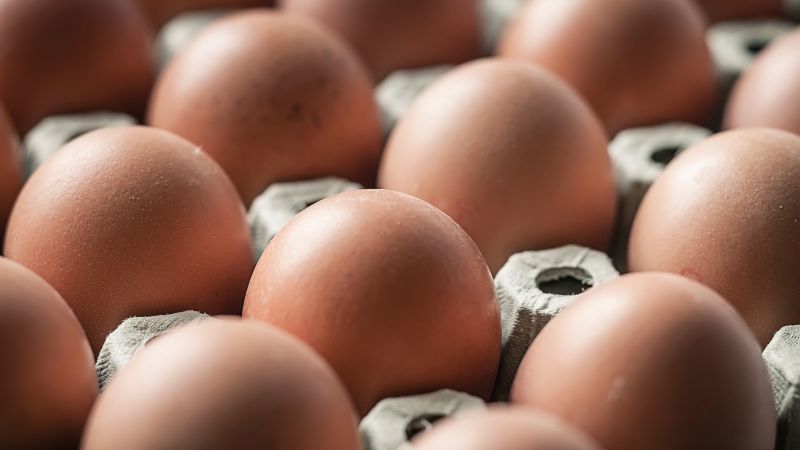More than 70 people across seven states have been sickened due to a salmonella outbreak linked to eggs recalled by a California-based egg distributor, according to the US Centers for Disease Control and Prevention.
On Friday, the August Egg Company recalled 1.7 million dozen brown cage-free and brown certified organic eggs, sold under multiple brand names, that have the “potential to be contaminated,” according to a recall notice from the US Food and Drug Administration.
Of the 79 people sickened, 21 people have been hospitalized and no deaths have been reported, the CDC said.
The eggs were sold to restaurants and retailers in Arizona, California, Illinois, Indiana, Nebraska, New Mexico, Nevada, Washington and Wyoming, according to the CDC. They were distributed at retail locations including Walmart, Save Mart, FoodMaxx, Lucky, Smart & Final, Safeway, Raleys, Food 4 Less and Ralphs.
thankfully we will soon stop tracking and reporting all this stuff so these sorts of problems should disappear really soon, just like covid did.
Wash the eggs. Wash your hands. Wash any surfaces that uncooked food comes in contact with. Cook your eggs properly (until whites and yolks are firm). For egg dishes like frittatas, you should cook them to an internal temperature of 160 degrees Fahrenheit. The real risk from salmonella is from foods that you eat raw like lettuce and tomatoes, etc.
“August Egg Company is not selling fresh shell eggs at this time. Our firm has voluntarily been diverting eggs to an egg-breaking plant for over 30 days, which pasteurizes the eggs and kills any potential foodborne pathogens,”
Pasteurize means heating the food to a high enough temperature for a long enough time to kill the germs. These tainted eggs are now being broken open and sterilized and sold to companies that will turn them into other products you buy. Next time you buy a breakfast sandwich at a fast food joint, or a container of egg-whites at the grocery store, it could very well be from this batch of eggs.
deleted by creator
Did you know the egg industry kills about 7 billion chicks globally, every single year? Well, now you do
Gotta crack some eggs to make an omelette
One of the many reasons why it’s cool being vegan
You know you can get salmonella from plants too, right? And you’re less likely to fully cook them.
I know how to cook, don’t worry
People are still buying eggs?
Always wash your eggs folks
Ironically, one of the reasons we have to refrigerate our eggs is because they’re required to be washed in the factory farm process which removes a natural protective membrane.
So that they spoil faster and profits would increase?
Actually the opposite. Our eggs need to be refrigerated, but the process also means they spoil slower if properly chilled. Washing also removes contaminants from the environment where they’re laid, which is not very hygienic because they’re fucking chickens, there’s old feed, dirt and chicken shit everywhere regardless of the type of size of facility or backyard. Having them washed during processing means you generally don’t need to bother washing them at home, you can just use them.
It’s two different ways of operating, each with some advantages and disadvantages.
Cool, I learned something new today. Dunno why I got sad votes for asking but idc
Halcyon to the rescue again!
While technically a question, the form it was asked is typically sarcastic.
It’s still a good idea to refrigerate them. It is possible, if unlikely, that salmonella can get inside the shell from the mother before the egg is laid. Keeping the eggs below 40 degrees Fahrenheit will keep the germs from growing inside during storage.
For those doubting me and down-voting.
Salmonella can get inside eggs too. This happens while the egg is forming inside the chicken before the egg makes a shell. Today, a lot fewer egg-laying hens have this problem than during the 1980s and 1990s, so eggs are safer. But some eggs are still contaminated with Salmonella.
I mean I keep mine in the fridge but then wash them again anyway Yolo





